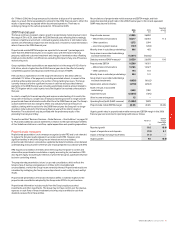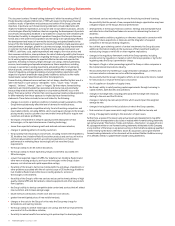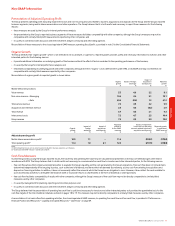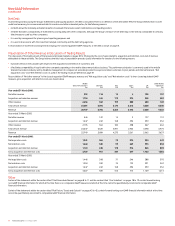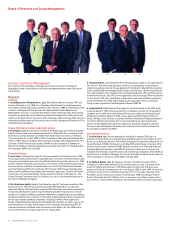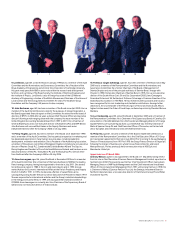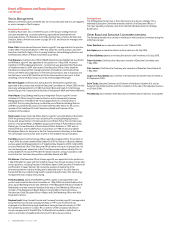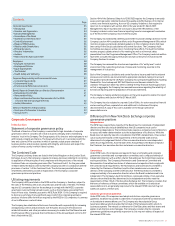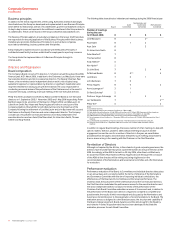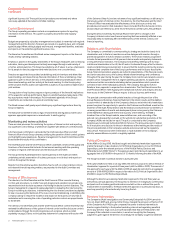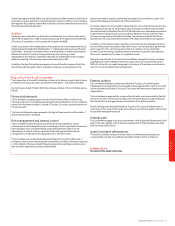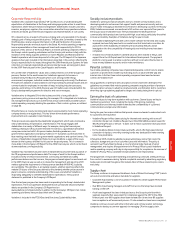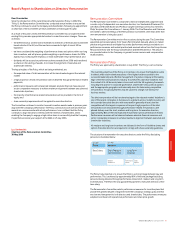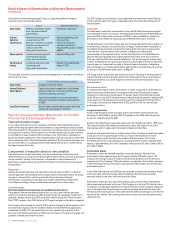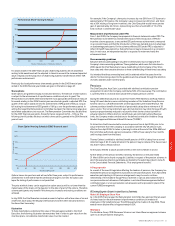Vodafone 2006 Annual Report Download - page 57
Download and view the complete annual report
Please find page 57 of the 2006 Vodafone annual report below. You can navigate through the pages in the report by either clicking on the pages listed below, or by using the keyword search tool below to find specific information within the annual report.
Vodafone Group Plc Annual Report 2006 55
The evaluations found the performance of each director to be effective and concluded
that the Board provides the effective leadership and control required for a listed
company. The Nominations and Governance Committee confirmed to the Board that
the contributions made by the directors offering themselves for re-election at the
AGM in July 2006 continued to be effective and the Company should support
their re-election.
Information and professional development
Each member of the Board has immediate access to a dedicated online team room and
can access monthly information including actual financial results, reports from the
executive directors in respect of their areas of responsibility and the Chief Executive’s
report which deals, amongst other things, with investor relations, giving Board members
an opportunity to develop an understanding of the views of major investors. These
matters are discussed at each Board meeting. From time to time, the Board receives
detailed presentations from non-Board members on matters of significance or on new
opportunities for the Group. Financial plans, including budgets and forecasts, are
regularly discussed at Board meetings. The non-executive directors periodically visit
different parts of the Group and are provided with briefings and information to assist
them in performing their duties. The non-executive directors and the Chairman regularly
meet without executives present.
The Board is confident that all its members have the knowledge, ability and experience
to perform the functions required of a director of a listed company. On appointment, all
directors are provided with appropriate training and guidance as to their duties,
responsibilities and liabilities as a director of a public and listed company and also have
the opportunity to discuss organisational, operational and administrative matters with
the Chairman, the Chief Executive and the Company Secretary. When considered
necessary, more formal training is provided.
Matters for the Board
The Board has a formal schedule of matters specifically referred to it for
decision, including:
•the approval of Group commercial strategy;
•Group strategic and long-term plans;
•major capital projects;
•approving annual budgets and operating plans;
•devising and reviewing the Group’s corporate governance structure;
•Group financial structure (including tax and treasury policy);
•approving statutory accounts and shareholder communications;
•Group risk management; and
•material contracts not in the ordinary course of business.
This schedule is reviewed periodically. It was last formally reviewed and updated by the
Nominations and Governance Committee in January 2004 and its proposals were
subsequently approved by the Board. Its currency and continued validity were assessed
as part of the performance evaluations conducted in the 2006 financial year described
earlier in this Report. The agendas for Board meetings are initially developed by the
Chief Executive and the Company Secretary and are finalised by the Chairman. The
directors have access to the advice and services of the Company Secretary and, both as
a group and individually, are entitled to take independent professional advice at the cost
of the Company on matters relating to the proper discharge of their responsibilities.
Executive Management
The executive directors, together with certain other Group functional heads and regional
chief executives, meet 12 times a year as the Executive Committee under the
chairmanship of the Chief Executive. The Executive Committee is responsible for the
day-to-day management of the Group’s businesses, the overall financial performance of
the Group in fulfilment of strategy, plans and budgets and Group capital structure and
funding. It also reviews major acquisitions and disposals.
Committees of the Board
The standing Board Committees are the Audit Committee, the Nominations and
Governance Committee and the Remuneration Committee. The composition and terms
of reference of these committees are published on the Group’s website at
www.vodafone.com. The Secretary to these standing Board Committees is the Company
Secretary or his nominee.
The Audit Committee
The Audit Committee is comprised of financially literate members having the necessary
ability and experience to understand financial statements. Solely for the purpose of
fulfilling the requirements of the Sarbanes-Oxley Act and the Combined Code, the Board
has designated John Buchanan, who is an independent non-executive director, satisfying
the independence requirements of Rule 10A-3 of the US Securities Exchange Act 1934,
as its financial expert on the Audit Committee. Further details of John Buchanan can be
found in “Board of Directors and Group Management”.
Under its terms of reference, the Audit Committee is required, amongst other things, to
oversee the relationship with the external auditors, to review the Company’s preliminary
results announcement, interim results and annual financial statements, to monitor
compliance with statutory and listing requirements for any exchange on which the
Company’s shares are quoted, to review the scope, extent and effectiveness of the
activity of the Group Internal Audit Department, to engage independent advisers as it
determines is necessary and to perform investigations.
The Audit Committee reports to the Board on the quality and acceptability of the
Company’s accounting policies and practices, including without limitation, critical
accounting policies and practices. The Audit Committee also plays an active role in
monitoring the Company’s compliance efforts for section 404 of the Sarbanes-Oxley Act
and receives progress updates at each of its meetings as well as a bi-annual status
presentation from the Programme Management Office.
At least twice a year, the Audit Committee meets separately with the external auditors
and the Group Audit Director without management being present. Further details on the
oversight of the relationships with the external auditors can be found under “Auditors”
and the “Report from the Audit Committee” which are set out on page 57.
The Nominations and Governance Committee
The Nominations and Governance Committee, which provides a formal and transparent
procedure for the appointment of new directors to the Board, generally engages
external consultants to advise on prospective Board appointees. This year, the
Committee recommended the appointment of three further non-executive directors.
Detailed role profiles were agreed by the Committee before external search consultants
were engaged to prepare a shortlist of potentially suitable candidates. Only after a
rigorous interview process were the appointments recommended to the Board.
The Committee also reviewed the Group’s succession plans, directed the performance
evaluations described earlier in this Annual Report, discussed matters of corporate
governance and assessed the independence of non-executive directors prior to
reporting to the Board.
The Remuneration Committee
The Remuneration Committee is responsible to the Board for the assessment and
recommendation of policy on executive remuneration and packages for individual
executive directors. The Committee has regular private sessions without executive
directors present. Further information on the Committee’s activities is contained in the
“Board’s Report to Shareholders on Directors’ Remuneration”.
Statement on Internal Control
Introduction
The Board has established procedures that implement in full the Turnbull Guidance,
“Internal Control: Guidance for Directors on the Combined Code”, for the year under
review and to the date of approval of the Annual Report. These procedures, which are
subject to regular review, provide an ongoing process for identifying, evaluating and
managing the significant risks faced by the Group.
Responsibility
The Board has overall responsibility for the system of internal control. A sound system of
internal control is designed to manage rather than eliminate the risk of failure to achieve
business objectives, and can only provide reasonable and not absolute assurance
against material misstatement or loss. The process of managing the risks associated
with social, environmental and ethical impacts is also discussed under “Corporate
Responsibility and Environmental Issues”, on pages 59 to 60.
Control structure
The Board sets the policy on internal control that is implemented by management. This
is achieved through a clearly defined operating structure with lines of responsibility and
delegated authority. The Executive Committee, chaired by the Chief Executive, manages
this on a day-to-day basis.
The Group’s brand essence, which encapsulates the Group’s commitment to integrity
and continuous improvement, in combination with the Group’s Business Principles, sets
the tone of the Group and reflects the control consciousness of management.
Written policies and procedures have been issued which clearly define the limits of
delegated authority and provide a framework for management to deal with areas of
Governance


